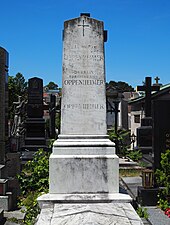Felix Oppenheimer
Felix Hermann Oppenheimer (born February 20, 1874 in Vienna , Austria-Hungary ; died November 15, 1938 there ) was an Austrian writer.
Life
Felix Oppenheimer was a son of the large landowner, entrepreneur and politician Ludwig Freiherr von Oppenheimer (1843–1909) and Gabriele (called Yella) von Todesco (1854–1943). When his father was raised to hereditary baron status, he was called Felix Hermann Freiherr von Oppenheimer from 1878 , and from 1919 onwards he was called Felix Hermann Oppenheimer again due to the Nobility Repeal Act . His parents' marriage was divorced in 1883 and he grew up with his mother in Palais Todesco in Vienna. There he introduced his friend Hugo von Hofmannsthal to the salon of his grandmother Sophie von Todesco .
Von Oppenheimer studied law at the University of Vienna from 1892 to 1898 and received his doctorate in 1898. By 1900 he went on a grand tour to Germany, England and France. Baron von Oppenheimer converted to Catholicism and married "Mysa" Marie Alexandrine Henriette de Ville Countess von Demblin (1876–1969) in 1900, they had three children. From 1901 to 1904 he worked as a concept official in the Labor Statistics Office of the Ministry of Commerce and then lived as a privateer . From 1904 he was with Alfred Freiherr von Berger , Leopold Freiherr Chlumecky and Carl Glossy editor of the Österreichische Rundschau. German magazine for politics and culture and editor for social policy and economics. The show was discontinued in 1924. Baron von Oppenheimer became chairman of the supervisory board of the first non-profit building company for small apartments .

As a patron of the arts , he co-founded the State Gallery Association in 1911 , which made him its honorary president. During the First World War he did military service, most recently with the rank of first lieutenant in the reserve. In the Republic of Austria he organized special exhibitions in museums in Vienna, including in 1930 about Maria Theresia von Habsburg in Schönbrunn Palace , 1933 about Prince Eugene of Savoy-Carignan in Belvedere Palace and 1935 about Franz Joseph I of Habsburg-Lothringen at Schönbrunn Palace.
After Austria's annexation in March 1938, Oppenheimer was discriminated against as a Jew and persecuted in the November 1938 pogroms . Oppenheimer died by suicide .
Fonts (selection)
- The housing shortage and housing reform in England. With special consideration of the newer housing legislation . Leipzig: Duncker & Humblot, 1900
- The Viennese municipal administration and the fall of the liberal regime in the state and the municipality . Vienna: Manz, 1905
- English imperialism . Vienna: Manz, 1905
- Raising funds for charitable building activities . Vienna: Manz, 1908 (= publications of the Central Office for Housing Reform in Austria. 4.)
- with Leopold Simony: The activity of the non-profit building companies for workers' houses . Vienna: Verlag der Baugesellschaft, 1910
- Vienna war welfare . Vienna: Fromm, 1914
- Baron Ludwig Oppenheimer. A sheet of memory from his son . Vienna: self-published [1915]
- From records and letters . Vienna: Fromme, 1919
- Montaigne. Edmund Burke and the French Revolution. Francis Bacon. Three essays . Vienna: Manz, 1928
- Museum associations abroad. Lecture given in the Albertina on December 3, 1934 . Vienna: Association of Museum Friends in Vienna 1934
- 25 years of association work for public art collections . Vienna: Neubauer, 1936
- From the old German embassy in Vienna. Memories and letters . Vienna: Krey 1938
literature
- MV Allmayer-Beck: Oppenheimer, Felix Hermann Frh. Von (1874-1938). In: Austrian Biographical Lexicon 1815–1950 (ÖBL). Volume 7, Verlag der Österreichischen Akademie der Wissenschaften, Vienna 1978, ISBN 3-7001-0187-2 , p. 238.
- Reinhard Müller : Felix Freiherr von Oppenheimer , at: Archives for the History of Sociology in Austria (AGSO), University of Graz, 2008
- Felix Hermann Oppenheimer , at: Vienna History Wiki
- Nicoletta Giacon: Hugo von Hofmannsthal - Yella, Felix and Mysa Oppenheimer: Correspondence. Part I . Hofmannsthal yearbook. 7 (1999), pp. 7-99
Web links
- Literature by and about Felix Oppenheimer in the catalog of the German National Library
- Literature by and about Felix Freiherr from 1874- in the bibliographic database WorldCat
| personal data | |
|---|---|
| SURNAME | Oppenheimer, Felix |
| ALTERNATIVE NAMES | Oppenheimer, Felix Hermann Freiherr von |
| BRIEF DESCRIPTION | Austrian writer |
| DATE OF BIRTH | February 20, 1874 |
| PLACE OF BIRTH | Vienna |
| DATE OF DEATH | November 15, 1938 |
| Place of death | Vienna |
